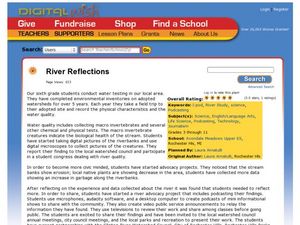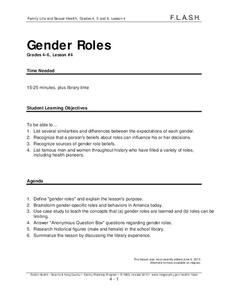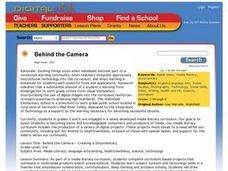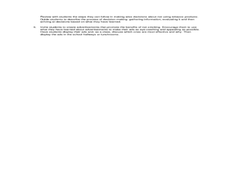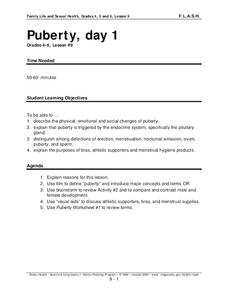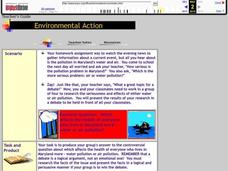Curated OER
River Reflections
Sixth graders create podcasts and video public service announcements. In this environmental advocacy lesson, 6th graders study the local watershed and become advocates for their local environment. In the process, they create podcasts and...
Curated OER
Sexual Exploitation, Day 2
Students discuss the importance of and ways to report sexual exploitation. They complete a worksheet and draw pictures of themselves and caption the drawing with an empowering message.
Curated OER
Puberty: Day 2
Young scholars investigate human health by researching sexual health facts. For this puberty lesson, students identify the changes that will occur in a teenage body over the next several years and what the eventual outcome will be. Young...
Seattle & King County Family-Planning Program
Gender Roles
Class members identify gender-specific roles and expectations in American society today by surveying adults, examining modern entertainment, and researching historical figures.
Baylor College
Crossing the Synaptic Gap
As part of a unit on the chemistry of the brain, thinkers learn how chemicals work to transmit messages between individual neurons and how controlled substances impact the synaptic cleft. They do so by playing a dice-and-card game in...
Baylor College
Tools of Magnification
Life science learners need to be able to use a microscope. With this comprehensive resource, they first experience how lenses and magnification work, and then get familiar with using a compound microscope. Tremendous background...
Baylor College
Observing Different Microbes
Following directions from a colorful slide preparation card, beginning biologists examine three different live microorganisms: bacteria, yeast, and paramecia. This is not an unusual activity to do with your class, but if you are doing it...
Curated OER
Topic: Persuasive Speech
Students examine what makes a speech persuasive. In this speech lesson, students recognizes what is needed to make a good persuasive speech and create their own persuasive speech about something related to the human body.
Curated OER
Puberty, Day 1
Students watch a film about puberty, define key terms and compare and contrast male and female development. They discuss the purposes of brassieres, athletic supporters and mentrual hygiene products.
Curated OER
Friendship
Students identify the characteristics of a good friend and assess themselves as a friend. They practice opening statements to initiate conversation and discuss ways to maintain friendships.
Curated OER
Sexual Exploitation, Day 1
Students discuss safe/unsafe and healthy/unhealthy touching. They discuss examples and ways of recognizing and getting out of exploitive situations.
Curated OER
Spelling Exercise: Affect or Effect
Fifteen example sentences need to be completed with either affect or effect. This printable exercise focuses on a discrete skill and could accomplish the mission if your class struggles with this particular distinction. Answer key is...
Baylor College
Microbes Are Everywhere
In a nutshell, your class will culture bacteria from their choice of surfaces. You will need to prepare or purchase agar plates. If you are new to this classic biology activity, this resource carefully walks you through the process of...
Curated OER
Topic: Persuasive Speech
Students write and present health related persuasive essays. For this persuasive essay lesson, students write a two minute long speech about how to stay fit, which they rehearse a home. They present the speech in a second class period.
Curated OER
Decision-Making
Students inquire about human psychology by completing a worksheet. In this sexual health lesson, students identify the types of decisions they will need to make in the future regarding sexual activity. Students define vocabulary terms...
West Virginia Department of Education
Oral Health Education Resource Kit
Brushing, flossing, a healthy diet, and personal hygiene are keys to good oral health and the information, the activities, and the experiments included in this packet will go a long way toward encouraging your class members to...
Curated OER
Behind the Camera
Scholars, in groups, gather information relating to community health care. Using video and digital cameras, they interview members of a health center staff. They then compile digital images, select music, and narrate a story about their...
Baylor College
About Air
Give your class a colorful and tasty representation of the components of the mixture that we call air. Pop a few batches of popcorn in four different colors, one to represent each gas: nitrogen, oxygen, argon, and carbon dioxide. The...
Curated OER
What Does Advertising Say About Smoking?
Pupils examine tobacco advertisements. In this smoking advertisements lesson, students read old magazine or newspaper ads to determine their purpose and influence. Pupils also discuss how to make responsible health decisions...
Curated OER
Ah Choo!
Students compare bacteria to viruses to find the differences. In this biology lesson, students research viruses they have been inoculated against, using the Internet. Students complete a graphic organizer of their research on common...
Curated OER
Sexual Exploitation: Day 2
Young scholars evaluate human psychology by answering sexual health study questions. For this exploitation lesson, students identify the main causes for sexual assault, the best ways to deal with it at the time and how to prevent it from...
Curated OER
Puberty
Students investigate life science by answering maturity questions. In this human health lesson, students identify the changes which occur during puberty and answer study questions based on sexual awareness. Students define scientific...
Curated OER
Environment: Assess Your Habitat's Health
Students research their ecozone in Canada and label on maps various parks and wildlife areas. They role-play as doctors with their ecozones as patients and search for symptoms from pollution, urbanization, loss of habitat, and decline of...
Curated OER
Environmental Action
Middle schoolers debate one another. In this pollution lesson plan, pupils work in teams to debate which is more serious, air or water pollution. They research their topic to come up with valid points to justify their side of the debate.
